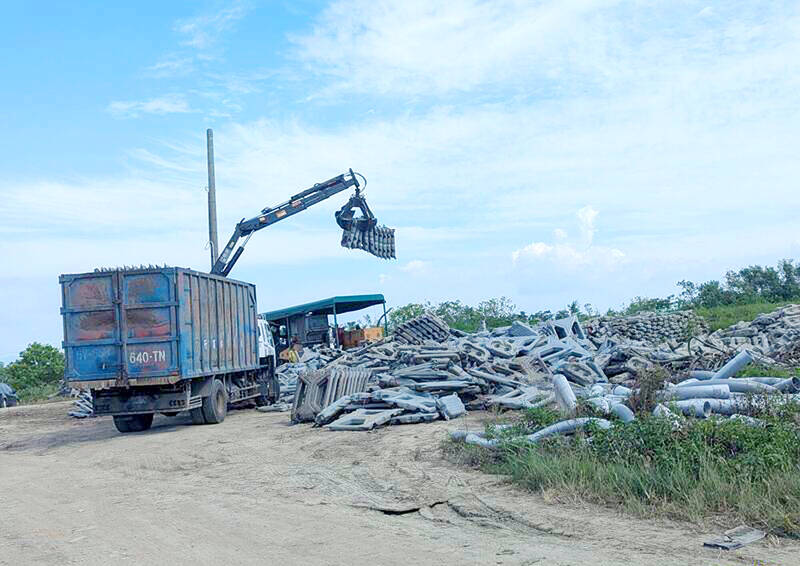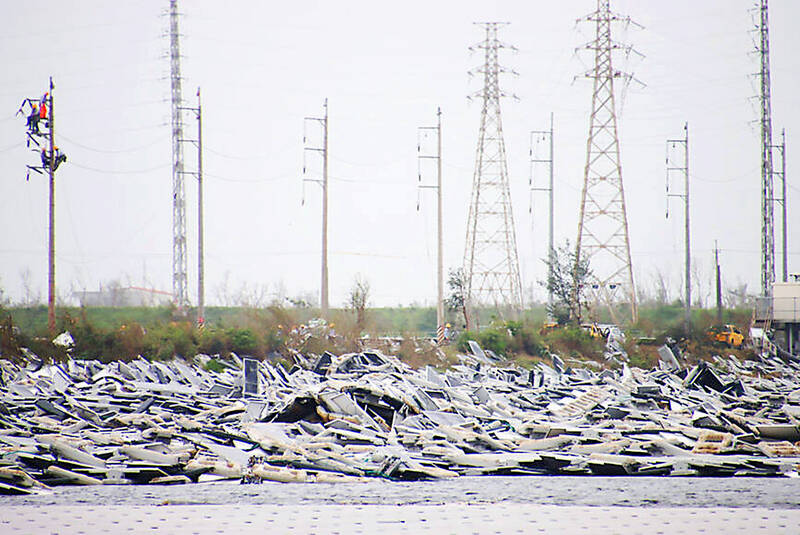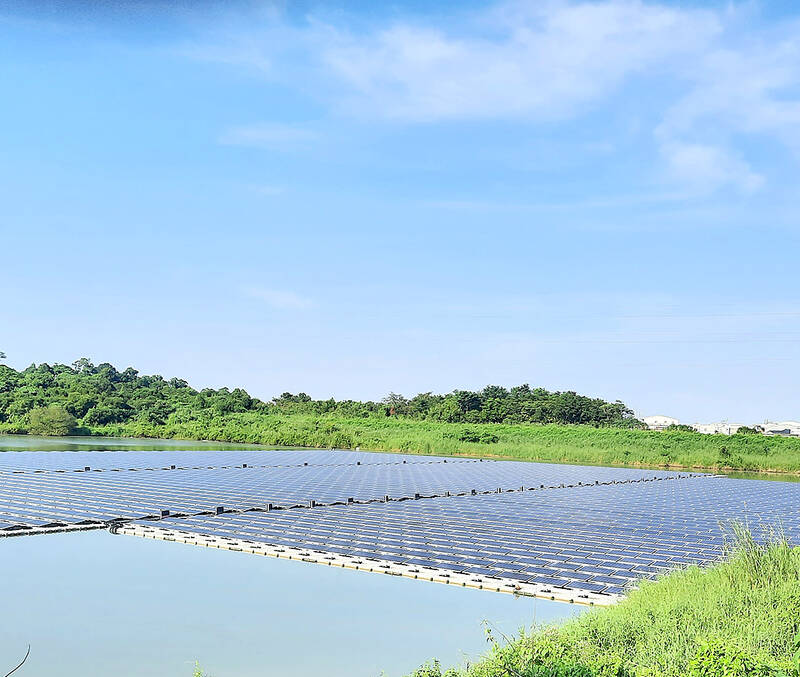Soon after Typhoon Danas wrecked floating photovoltaic (PV) arrays in southwestern Taiwan in the first week of July, a video began to circulate online. It showed a bird drinking from a reddish puddle beside a stack of broken PV panels, then appearing to drop dead within seconds.
Assuming the water contained toxins that had leached from the panels, some viewers jumped to a frightening conclusion: The PV systems now deployed on several reservoirs and scores of fish farms must be poisoning animals and people.
The central government, aware that such misinformation could complicate its efforts to expand Taiwan’s renewables, moved quickly to refute the rumor. According to a Ministry of Environment (MOENV) press release, on Aug. 7 their personnel visited the site, Sinjhuang Flood Detention Pond (新庄滯洪池) in Chiayi County’s Yijhu Township (義竹), to carry out tests. Neither heavy metals nor oil were detected; the pH value was normal, and the red-tinged water was attributed to the presence of humic acid in the soil.

Photo: Wang Shan-yan, Taipei times
Minister of the Environment Peng Chi-ming (彭啟明) inspected the site on Aug. 16, and confirmed that the businesses commissioned to complete the cleanup was doing so “in accordance with regulations.” Neither discarded panels nor other waste or pollution were found, but “similar reddish-brown water quality was observed,” proving that it was a natural phenomenon related to the soil type and debunking the rumors, the press release said.
More than a week later, however, piles of broken PV equipment were still visible around the pond, prompting the government to fine the operator NT$9 million. According to the United Daily News (Aug. 26), the company commissioned to clear the debris said it was a lengthy task, because the solar panels had first to be separated from the floats, then transported to one of the few enterprises authorized to process PV waste.
FAKERY AND CONFUSION

Photo: CNA
On Aug. 25, Taiwan FactCheck Center (TFC, 台灣事實查核中心) reported that the bird-death video had been generated with the assistance of AI — and that its creator, when posting the seven-second clip on microblogging platform Threads, had said so. It’s difficult to guess their motives; that Threads account later disappeared, TFC noted.
TFC, an NGO established in 2018, is accredited by Poynter Institute’s International Fact-Checking Network (IFCN). In the past two years, the center has published 13 reports addressing misinformation about the environmental consequences of solar power.
On Oct. 16 this year, TFC explained that online rumors about the quality of the water in Tainan’s Wushantou Reservoir (烏山頭水庫) following the installation of a major floating PV system were the result of individuals misinterpreting transparency-index data released by the MOENV. The same day, the center released a separate statement in response to social media posts that claimed water quality tests at Wushantou had detected cleaning agents. Some netizens said the concentrations indicated that the reservoir contained 2,273kg of cleaning products. TFC pointed out that while five tests had found anionic surfactants, the results didn’t exceed acceptable limits, and two other tests had detected none. (Anionic surfactants are widely used in cleaning products, but also released into the environment via pesticides or industrial processes.)

Photo: Lin Yi-chang, Taipei Times
On Oct. 17, the center revealed that a video, supposedly showing solar panels at Wushantou being cleaned with chemicals, was originally posted on Chinese platforms by a PRC-based supplier of PV cleaning equipment. What’s more, it appeared in May 2022, 11 months before the first scheduled cleaning of the Wushantou array.
According to TFC Deputy Editor-in-chief Chen Pei-huang (陳培煌), these narratives mostly originate from social media or online discussion forums.
“They often combine genuine concerns about environmental impact with misinformation or misleading visuals. In our assessment, the majority are not deliberately malicious but stem from misunderstanding, incomplete information or distrust toward renewable-energy policies,” he says.

Photo: Steven Crook
Noting that limited scientific literacy and low trust in institutions make people more susceptible to false claims like those swirling around Wushantou, Chen explains that some individuals have a tendency to share content that’s intuitive or emotionally charged, even if there’s no evidence.
Not all of those who shared the bird death video or the assertion that Wushantou Reservoir is tainted with detergent can plead scientific illiteracy. One person who lent credence to the latter is Victor Su (蘇一峰), a chest physician in Taipei with 121,000 followers on Facebook.
Whether Su is among those who, in Chen’s words, “amplify such narratives for political or ideological reasons,” is beyond the scope of this article. However, his recent activity on Facebook suggests that he’s not a fan of the current administration.
Su’s Oct. 14 post about water quality at Wushantou attracted around 39,000 reactions and close to 3,000 comments, some of which harshly criticized the doctor’s claims. As of Nov. 6, it had been shared over 1,200 times. A TFC Facebook post made on Oct. 16 and addressing the same issue had much less of an impact, drawing 1,000 reactions and 195 shares by Nov. 6.
As Jonathan Swift wrote in 1710, “Falsehood flies, and the truth comes limping after it.”
SOLAR’S MYRIAD PROBLEMS
Chen says TFC has found that fact-checking environmental claims “requires collaboration with scientists, environmental journalists and energy experts. The goal isn’t only to debunk falsehoods but also to provide accessible scientific context, so the public can better understand complex issues like climate change and renewable energy.”
He calls on the authorities to engage in “effective public communication and transparent policy explanation,” as these can greatly reduce the spread of misinformation.
Opponents of solar energy hardly need to fabricate videos or spread rumors if they aim to cultivate public skepticism. As a recent Control Yuan report (“Questions Concerning Photovoltaic Project Applications,” published Oct. 20) makes clear, the rapid rollout of solar energy in Taiwan has been accompanied by corruption and market distortion.
The report mentions organized crime, noting that one foreign enterprise quit Taiwan after suffering six years of intimidation and blackmail attempts. Gangs have been known to mobilize protests under the pretext of environmental damage, and even directly disrupt construction, as ways of extorting money from companies.
Many in the renewables industry complain that policies often change, and that regulatory enforcement is inconsistent. What’s more, the report says, “unscrupulous individuals try to profit by exploiting lengthy and opaque processes.”
The Control Yuan document also highlights problems with the government’s “aquaculture-electricity symbiosis” policy, a scheme which encourages fish farmers to install PV systems over their ponds. Ministry of Agriculture rules make it hard for some fish-farm owners to qualify and, because they “fail to consider aquaculture practices,” the regulations sometimes undermine investment and financing proposals.
The report asserts that, without solar-power subsidies, a significant number of fish farmers would likely cease operating. This is framed as a criticism, saying current policies have created “the phenomenon of using electricity revenue to subsidize fisheries.” But if Taiwan is to bolster its food security as well as energy security, aquaculture-electricity symbiosis seems like a logical way of feeding two birds with one scone.
Steven Crook, the author or co-author of four books about Taiwan, has been following environmental issues since he arrived in the country in 1991. He drives a hybrid and carries his own chopsticks. The views expressed here are his own.

This is the year that the demographic crisis will begin to impact people’s lives. This will create pressures on treatment and hiring of foreigners. Regardless of whatever technological breakthroughs happen, the real value will come from digesting and productively applying existing technologies in new and creative ways. INTRODUCING BASIC SERVICES BREAKDOWNS At some point soon, we will begin to witness a breakdown in basic services. Initially, it will be limited and sporadic, but the frequency and newsworthiness of the incidents will only continue to accelerate dramatically in the coming years. Here in central Taiwan, many basic services are severely understaffed, and

Jan. 5 to Jan. 11 Of the more than 3,000km of sugar railway that once criss-crossed central and southern Taiwan, just 16.1km remain in operation today. By the time Dafydd Fell began photographing the network in earnest in 1994, it was already well past its heyday. The system had been significantly cut back, leaving behind abandoned stations, rusting rolling stock and crumbling facilities. This reduction continued during the five years of his documentation, adding urgency to his task. As passenger services had already ceased by then, Fell had to wait for the sugarcane harvest season each year, which typically ran from

It is a soulful folk song, filled with feeling and history: A love-stricken young man tells God about his hopes and dreams of happiness. Generations of Uighurs, the Turkic ethnic minority in China’s Xinjiang region, have played it at parties and weddings. But today, if they download it, play it or share it online, they risk ending up in prison. Besh pede, a popular Uighur folk ballad, is among dozens of Uighur-language songs that have been deemed “problematic” by Xinjiang authorities, according to a recording of a meeting held by police and other local officials in the historic city of Kashgar in

It’s a good thing that 2025 is over. Yes, I fully expect we will look back on the year with nostalgia, once we have experienced this year and 2027. Traditionally at New Years much discourse is devoted to discussing what happened the previous year. Let’s have a look at what didn’t happen. Many bad things did not happen. The People’s Republic of China (PRC) did not attack Taiwan. We didn’t have a massive, destructive earthquake or drought. We didn’t have a major human pandemic. No widespread unemployment or other destructive social events. Nothing serious was done about Taiwan’s swelling birth rate catastrophe.